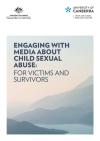Reporting on child sexual abuse – guidance for media and victims and survivors
Content warning: this page and documents within include material about child sexual abuse and its portrayal in media that some people might find confronting. If you need assistance or support, visit our support services page.
We commissioned the University of Canberra News and Media Research Centre to develop evidence‑based media guides to encourage responsible reporting on child sexual abuse and to support victims and survivors when engaging with the media.
The key aim of these resources is to promote reporting that raises community awareness of child sexual abuse, reduces stigma, and empowers victims and survivors when they share their personal experiences with the media.
Guidance for media who are reporting on child sexual abuse

Reporting on child sexual abuse: Guidance for media
The guide encourages reporting that raises community awareness of child sexual abuse, reduces stigma, and empowers victims and survivors when they share their personal experiences with the media. It includes advice on how to develop and frame stories appropriately, language and terminology to use and avoid, and sensitivities to consider when engaging with victims and survivors.
Quick reference guides
Key principles for journalists reporting on child sexual abuse
A snapshot of the 5 key principles media professionals should be aware of when reporting on child sexual abuse.
Language and terminology guide
A short guide to using appropriate language and terminology, including harmful and re‑traumatising language to avoid.
Practical guidance for editors and sub-editors
A short guide for editors and sub‑editors on how to support journalists who are reporting on child sexual abuse.
Practical guidance for court reporters
A short guide and key considerations for court reporters who are reporting on child sexual abuse.
Guidance for victims and survivors engaging with the media

Engaging with media about child sexual abuse: For victims and survivors
This guide supports victims and survivors and their families to safely and effectively engage with media professionals. It provides advice on informed consent, understanding how the media works, setting boundaries, and ensuring safety and support networks are in place.
Quick reference guide
Key principles for victims and survivors engaging with the media
A snapshot of the 5 key principles to support victims and survivors and their families when engaging with media professionals.
Translated guides
Find the guidance for media and guidance for victims and survivors in your language.
Developing the guides
The University of Canberra undertook comprehensive research to inform the development of the guides, including a literature review and quantitative and qualitative analysis of media coverage on child sexual abuse over a 2‑year period.
The guides have also been informed by robust consultation, involving face-to-face and online workshops, small group sessions and individual meetings with over 100 victims and survivors, advocates, journalists, editors, podcasters, academics, and policy and research staff.
Read the full research report and consultation summary on the University of Canberra website.
